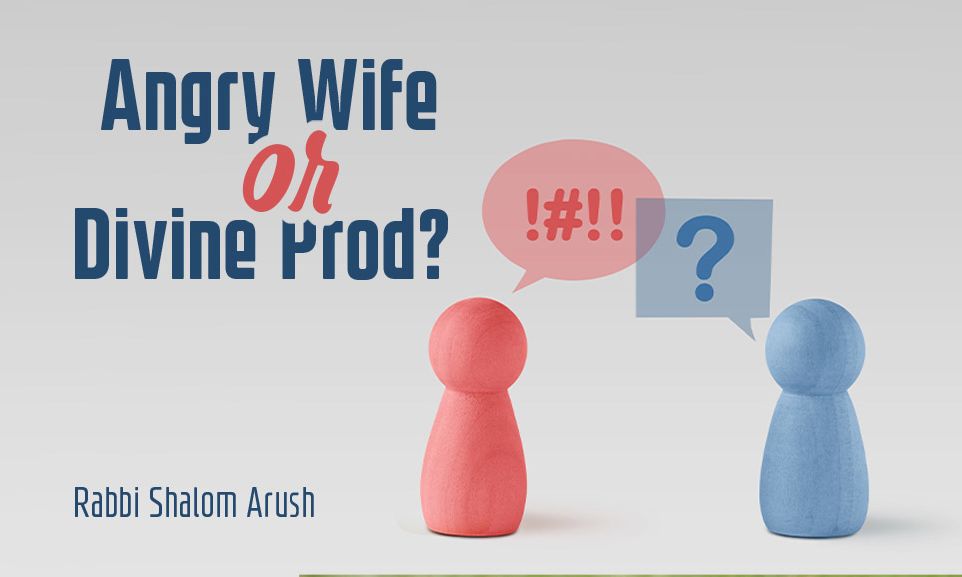
Angry Wife or Divine Prod?
When we don't initiate teshuva on our own accord, Hashem – Who loves us so much – stimulates us. Often, He uses our wives as a prod, especially during the Shovevim weeks…

The “Shovevim” weeks, which we have now entered, are a special time for working on personal holiness and teshuva. But, if we don’t initiate teshuva on our own accord, Hashem – Who loves us so much – stimulates us. Often, He uses our wives as a prod to mobilize us towards the goal of self-assessment. Here’s how:
Husbands periodically see faults in their wives that need rectification. Maybe the wife suffers from anger and screams at or hits the children. As a person with emuna, he prays to Hashem that she should rectify her fault, saying, “Hashem, help my wife overcome her short temper; have mercy on her, and rid her of her terrible anger!” Such prayer is a mistake, the advice of the evil inclination.
The above husband’s prayer is not coming from a point of truth. It is not the result of the husband’s care and compassion for his wife and his true concern for her welfare. He just wants to put an end to his own  suffering; for his own convenience, he wants her to be calm and happy. Therefore, his prayer stems from his care about himself and not from his concern for her.
suffering; for his own convenience, he wants her to be calm and happy. Therefore, his prayer stems from his care about himself and not from his concern for her.
If Hashem doesn’t love this husband, then his prayer will be answered. Sounds strange, doesn’t it? Let’s see why:
A person who prays for his wife to correct her faults is severing himself from Divine providence. He’s not looking at the fact that Hashem is sending him tribulations – in the guise of his wife’s faults – as a prodding agent to arouse him to teshuva. Therefore, by praying for her rather than he doing teshuva, he makes two mistakes:
First, by pinning the blame on her, he in effect makes the statement that he doesn’t need to do teshuva.
Second, by refusing to accept Hashem’s “prod” in the form of his wife’s apparent fault, he invokes an alternate prod which is usually much more severe. Hashem won’t give in to him, and will keep prodding until he gets the message and fixes whatever needs fixing. Such a husband is trading tribulations for tribulations, or as Rebbe Nachman says, “When folks don’t want a small measure of suffering, they get a large measure of suffering.”
Most divorces result from people’s unwillingness to cope with the daily challenges of marriage. Rather than solving problems at the core, trying to understand what Hashem wants from them, they look for a quick and easy exit, which oftentimes is neither quick nor easy. If they’d wake up at an early stage, they’d succeed and be happy. Instead, they get divorced – swapping their marital difficulties which are rectifiable – for the unspeakable anguish of divorce, whose damages are much more difficult to correct. They would have been much better off working on emuna and teshuva, as I explained in detail in The Garden of Peace.
Therefore, if Hashem loves the husband who is praying about his wife’s faults, He won’t answer his prayers. Hashem doesn’t want him to substitute prods. But, if this person has really angered Hashem, Hashem just might answer his prayers. Suddenly, his wife won’t be angry anymore, but that’s not good news, for the husband will ultimately receive a tribulation that’s much more arduous. And, there’s something even worse than more arduous tribulations: if a person is so stiff-necked that he doesn’t want to hear about teshuva, Hashem will do nothing to arouse him. All this person’s heavy spiritual debits will have to be accounted for at the end, Heaven forbid.
The right way to pray is to ask Hashem to help us do teshuva, since there are no tribulations without prior transgression (see tractate Shabbat 55b). Now we can correct the sin we are committing that brought on the tribulation. Especially during these weeks of “Shovevim,” Hashem is more than happy to accommodate us and help us return to Him.
And if you’re reading this article during a different time of the year, don’t want until Parshat Shemot… every day is a good day to start working on your personal holiness, and start understanding Hashem’s hints to you through your wife!






